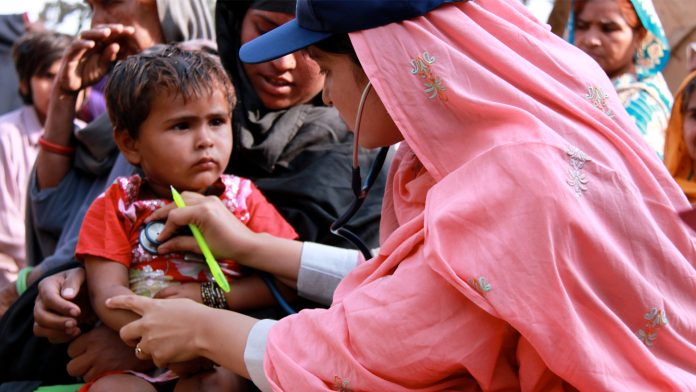
Health Europa looks at the work of Europe’s research centres in identifying what can be done to strengthen patient care and response in disaster medicine, and how this care can be delivered in the most efficient way, even in critical scenarios.
Natural disasters and major incidents create an imbalance in medical services between the urgent need for medical assistance and accessible resources. As a result, disaster medicine targets the epidemiology and organisation of medical responses to major incidents and natural disasters, as well as planning for these unique and demanding scenarios. Therefore, those physicians working within disaster scenarios need to be equipped with effective and efficient training, as part of a thorough disaster action plan.
Here, Health Europa looks at the work of Europe’s research centres in identifying what can be done to strengthen patient care and response in disaster medicine, and how this care can be delivered in the most efficient way, even in critical scenarios.
A European approach to emergency response
Prior to the large demand for urgent medical care in the wake of the 9/11 terror attack in the USA, the European Society for Emergency Medicine (EUSEM) acknowledged the importance of disaster medicine – both in its 1998 Manifesto and with the launch of the Disaster Medicine Section, established in Munich, Germany, in September 2008.
The Disaster Medicine Section of EUSEM has several aims under its mission statement, including:
- Promotion and distribution of research, education, preparedness and training of physicians, in relation to disaster medicine;
- The formulation of a ‘culture and language’ surrounding disaster medicine in Europe, thus facilitating standardised, cross-country responses to those events which may lead to mass casualties;
- Raising awareness amongst emergency physicians of disaster medicine education, including preparation, prevention, mitigation and rehabilitation; and
- Stimulating involvement and increasing the level of education, training and care.
With members from Belgium, Cyprus, France, Germany and Greece, amongst others, EUSEM is conducting efforts to: lead, promote and distribute educational activities in the field of disaster medicine, whether that be through courses, projects, or the establishment of clinical guidelines; work actively in developing shared, cross-boundary protocols which could be of use throughout Europe in disaster scenarios; and seek dialogue and engagement with other European scientific emergency medicine and disaster medicine societies, in order to understand local issues and conditions more effectively.
A health crisis
Similarly, the Research Center in Emergency and Disaster Medicine (CRIMEDIM) works to ensure that the health systems in place are sufficient to protect the health of people, even in disasters and humanitarian crises. Subsequently, CRIMEDIM explores how physicians and medical services can ensure that lives are saved whilst deaths and injuries are limited. In efforts to enhance the resilience of the health system in such unique scenarios, CRIMEDIM aims to target health workers at local, national and international levels. CRIMEDIM works to:
- Increase knowledge;
- Increase skill; and
- Alter the attitudes of health workers.
Through co-operating with various institutions, universities, public and private agencies, and governmental and nongovernmental organisations, CRIMEDIM operates under the objective of bolstering the resilience of health systems. Furthermore, the centre uses research projects to increase the level of education around disaster medicine.
The TEAMS project
CRIMEDIM leads a consortium of members – the Humanitarian and Conflict Response Institute, UK; the Karolinska Institutet, Sweden; Tel Aviv University, Israel; Istanbul Medeniyet University, Turkey; Humedica, Germany; and Novareckon, Italy – in the EU-funded project Training for Emergency Medical Teams and European Medical Corps (TEAMS). The TEAMS project is working towards developing a standardised package for training which focuses upon operational team training within emergency medical teams (EMTs). Its final result – an open, online training package – will combine teaching materials and simulation exercises focused on team training. The package will be adaptable to varying EMTs, whilst being sustainable in less economically developed countries and those with poor resources.
The European Center for Disaster Medicine (CEMEC)
Based in the Republic of San Marino, Italy, the European Center for Disaster Medicine (CEMEC) hosts scientific and educational activities in efforts to increase the level of training for disaster and emergency medicine. Disaster medicine addresses the demand from international organisations, authorities and institutes to co-ordinate responses and collaboration in all disasters, regardless of their origin. As a result, disaster medicine utilises the skills of specialists in crisis scenarios, ensuring that physicians respond appropriately and professionally in exceptional events.
As reported by the Council of Europe, the sole objective of CEMEC is to ‘mitigate the impact of natural and technological disasters on human life’. To this end, CEMEC works through several means, including:
- Designing and supporting standardised teaching programmes which are suitable for trainees across Europe, and from a varied range of professionals within health;
- Promotion and co-ordination of appropriate research;
- Organisation of relevant congresses and other scientific meetings;
- Promotion of both political and public awareness of disaster medicine;
- Promotion of discussion between differing professional disciplines within healthcare; and
- Advising the relevant European, national and international bodies on matters concerning disaster medicine.
This article will appear in issue 5 of Health Europa Quarterly, which will be published in May.








